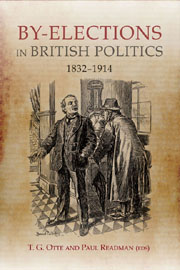Book contents
- Frontmatter
- Contents
- List of Figures and Tables
- List of Contributors
- Preface and Acknowledgements
- List of Abbreviations
- Introduction
- 1 ‘Plumping Contests’: The Impact of By-elections on English Voting Behaviour, 1790–1868
- 2 Government Appointment By-elections: 1832–86
- 3 ‘We should have had 1,000’: The By-elections of the 1874 Parliament
- 4 ‘The Glamour of Independence’: By-elections and Radicalism during the Liberal Meridian, 1869–83
- 5 ‘The Swing of the Pendulum at Home’: By-elections and Foreign Policy, 1865–1914
- 6 By-elections and the Modernisation of Party Organisation, 1867–1914
- 7 ‘A Terrific Outburst of Political Meteorology’: By-elections and the Unionist Electoral Ascendancy in Late-Victorian England
- 8 Land Reform and By-elections, 1885–1914: Do By-elections Matter?
- 9 Edwardian By-elections
- 10 Lloyd George, Limehouse and the Realignment of British Politics: The Bermondsey By-election of 1909
- 11 By-elections and the Peculiarities of Scottish Politics, 1832–1900
- Index of By-election Contests
- General Index
Introduction
Published online by Cambridge University Press: 05 May 2013
- Frontmatter
- Contents
- List of Figures and Tables
- List of Contributors
- Preface and Acknowledgements
- List of Abbreviations
- Introduction
- 1 ‘Plumping Contests’: The Impact of By-elections on English Voting Behaviour, 1790–1868
- 2 Government Appointment By-elections: 1832–86
- 3 ‘We should have had 1,000’: The By-elections of the 1874 Parliament
- 4 ‘The Glamour of Independence’: By-elections and Radicalism during the Liberal Meridian, 1869–83
- 5 ‘The Swing of the Pendulum at Home’: By-elections and Foreign Policy, 1865–1914
- 6 By-elections and the Modernisation of Party Organisation, 1867–1914
- 7 ‘A Terrific Outburst of Political Meteorology’: By-elections and the Unionist Electoral Ascendancy in Late-Victorian England
- 8 Land Reform and By-elections, 1885–1914: Do By-elections Matter?
- 9 Edwardian By-elections
- 10 Lloyd George, Limehouse and the Realignment of British Politics: The Bermondsey By-election of 1909
- 11 By-elections and the Peculiarities of Scottish Politics, 1832–1900
- Index of By-election Contests
- General Index
Summary
‘“Ah”, said Mr. Pickwick, “do they seem devoted to their party, Sam?”
“Never seen such dewotion in my life, Sir”
“Energetic, eh?”, said Mr. Pickwick.
“Uncommon”, replied Sam.’
Charles Dickens, Pickwick PapersStudents of Victorian and Edwardian electoral politics are confronted with a paradox. For all the energetic exertions of the parties and their agents at parliamentary by-elections, and for all the importance contemporaries attached to such contests, they have rarely left their mark on the scholarly literature. On the contrary, the historical study of British electoral politics is concentrated on general elections. There are obvious reasons for this. General elections decide the fate of governments and determine the overall balance of parties in parliament. They are national events; and they are treated as milestones in the narratives of political history, as attested in the titles of innumerable books. Important as they are, however, general elections do not comprise anything like the totality of British electoral behaviour. Britons cast their parliamentary ballot on other occasions, at by-elections triggered by the death, resignation or retirement of sitting MPs, and they do so often. Just quite how often is frequently overlooked by historians. While some literature exists on twentieth-century by-elections, most notably Chris Cook and John Ramsden's collection of essays, far less has been published on the Victorian and Edwardian periods. This is not to say they have been ignored entirely, but coverage is uneven at best.
- Type
- Chapter
- Information
- By-Elections in British Politics, 1832-1914 , pp. 1 - 22Publisher: Boydell & BrewerPrint publication year: 2013



